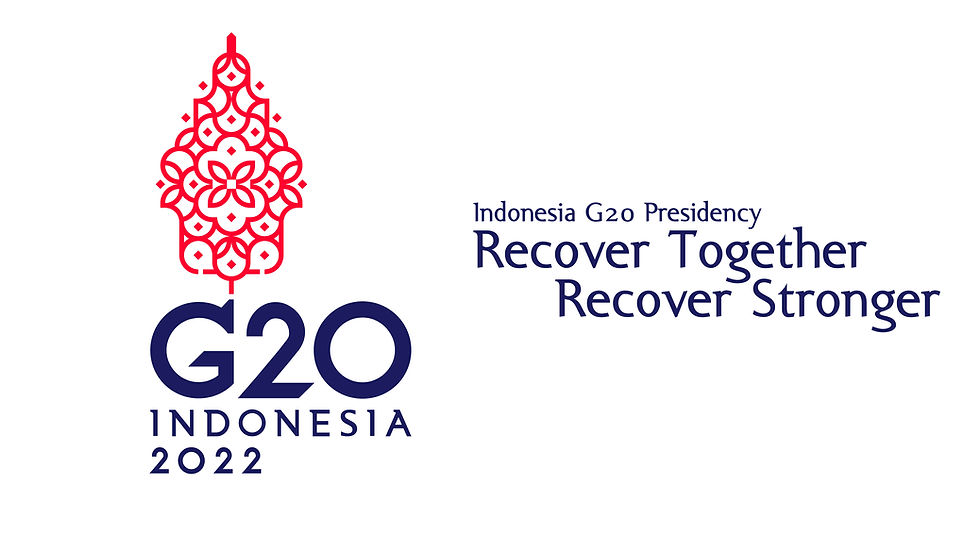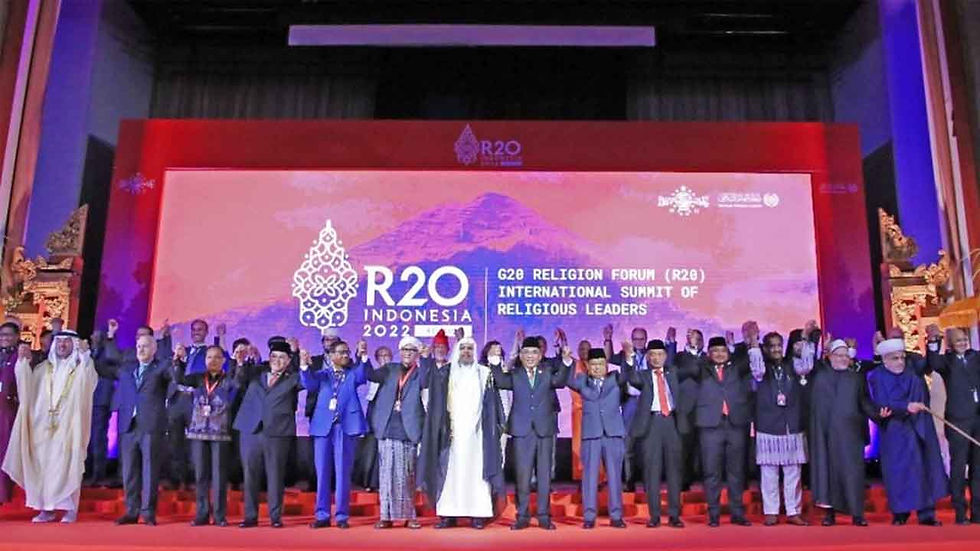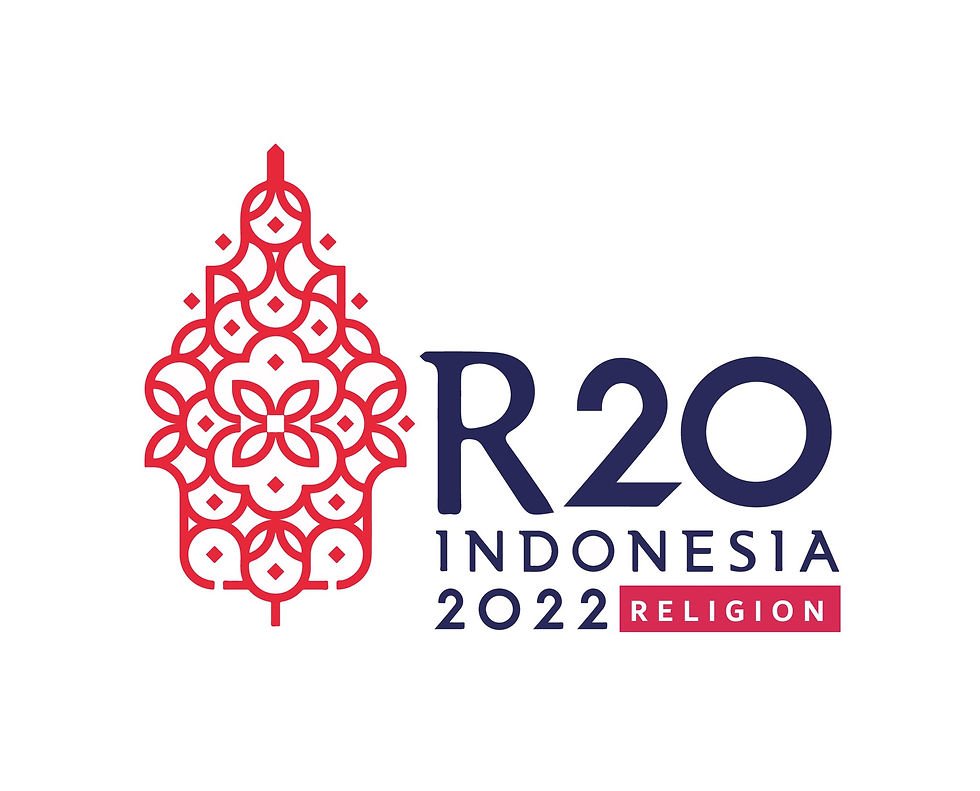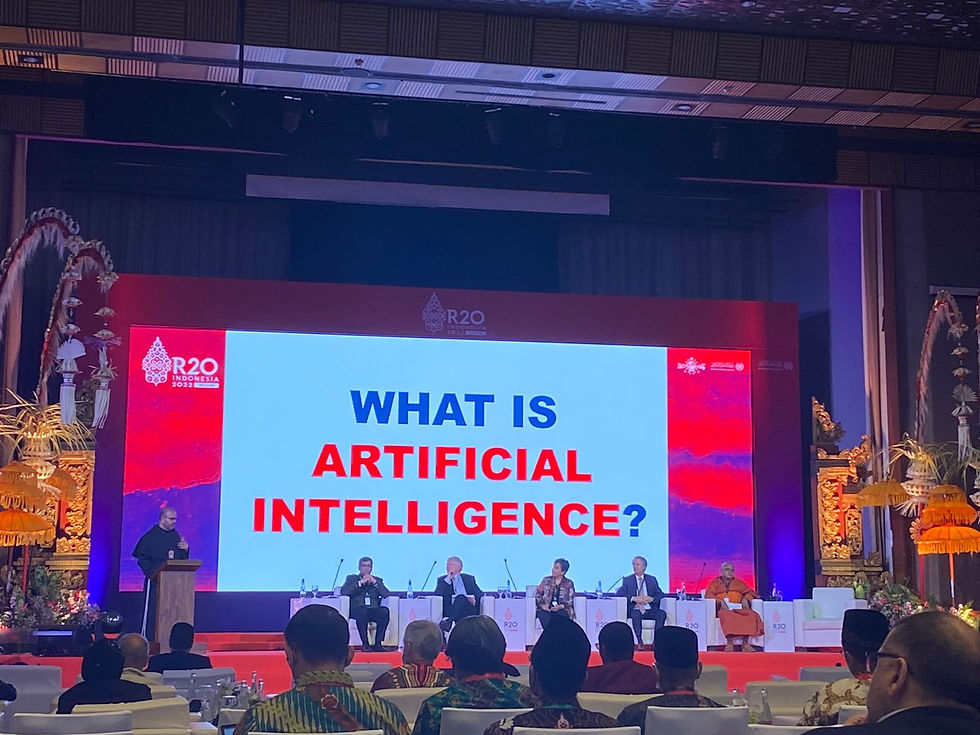Algorethics - G20 Religion Forum (R20) Indonesia 2022
- Paolo Benanti
- 4 nov 2022
- Tempo di lettura: 7 min
Algorethics:
The Timeless Values of Religion and Their Irreplaceable Contribution to
the Humane and Peaceful Development of Artificial Intelligence
Rev. Paolo Benanti (Italy)
Presented to the G20 Religion Forum (R20)
Bali, Indonesia, 2 – 3 November 2022

Excellencies and distinguished guests,
Thank you for your warm welcome. I am here in front of you, whom I thank for participating in this wonderful event, to talk about two things: artificial intelligence and peace. Being here with you at the G20 Religion Forum is a great honor for me. It is also a valuable opportunity. For I hope that your witnessing my appeal — delivered in this august forum, and addressed to the entire human family — will lead to the widest possible dissemination of our shared aspirations and agenda.

We all know that science and technology play a major role in the profound transformations that the world is currently undergoing, particularly in view of their close connection with the domains of economics and finance.
If we subject the role of technology to closer scrutiny, we shall notice that it is affecting and modifying every dimension of human existence, including social relationships. Today, we appreciate the multiple benefits of this transformation. For instance, without technology, it would be impossible for us to interact in real time, or to enjoy the countless innovations designed and created by the human mind.
At the same time, the dangers and grey areas of technology are more difficult to fathom. For technology is not simply a tool. Whether it is beneficial or harmful depends not only on the way we use technology, but on multiple factors that are seldom immediately perceptible.

In fact, the devices that we use have become an integral part of the world we inhabit, to the extent that they are practically invisible components of our social environment.
Over the past few years, technology has gone through increasingly rapid cycles of development, producing more and more innovations. We have witnessed the digital transformation of technology; the emergence of “big data”; and an exponential increase in computational power.
Thanks to these developments, what we may describe as an “Artificial Intelligence Spring” has blossomed, and now permeates the lives of each and every one of us.
But the innovation produced by artificial intelligence is not an unalloyed blessing. It also has many neutral and even sinister aspects which, if not harnessed and directed for the good of all humanity, may evolve to its profound detriment.
In fact, most people are unaware of the operational procedures of artificial intelligence. However, AI is pervasive and ever more present in countless fields, such as manufacturing, healthcare, education, nutrition, security, and other realms that shape our daily lives. In short, AI is everywhere; and thanks to its rising power, its role will continue to increase in the coming years.

We need to pay close attention to what is happening in this arena, because an enormously valuable tool created by the human intellect can turn out to be a valuable friend, making our lives easier; or it can become an instrument of oppression used to control, direct or otherwise influence humanity, especially weak, vulnerable and less educated members of society.
Moreover, artificial intelligence may prove to be “all-defining” for younger generations, future generations, the elderly and the poor.
This is why, a little over two years ago, in February 2020, we launched, together with stakeholders of various kinds, the “Rome Call for AI Ethics.” This appeal, which I am making to you assembled here today, is addressed to international organizations, governments, institutions, the private sector, and society as a whole. Its purpose is to promote a sense of shared responsibility and encourage a joint effort to create a future in which digital innovation and technological progress foster peace. The development of AI in the service of humankind and the planet must be reflected in principles and regulations that protect people — particularly the weak and the underprivileged — and natural environments.
The signatories of the Rome Call commit to respect its six principles. These principles — transparency, inclusion, responsibility, impartiality, reliability, and security and privacy — are the pillars of our work. We call this approach “algorethics.”
At a time when new technologies are constantly multiplying their applications in real life, the Rome Call for AI Ethics urges everyone to say: “Let us think this through. Let us act consciously. Let us consider the consequences of our actions.”

Let’s try to ask ourselves: Do we really want machines to threaten our dignity, our right to live as free and conscious individuals, and the legitimate privacy of our personal lives? Do we really want all of us to be profiled unknowingly, and do we welcome the advent of a world in which algorithms make decisions based on ethnicity, gender and age? Is there really no other solution than entrusting artificial intelligence with decisions on job offers, loans or criminal proceedings? Do we really want to unconditionally trust a mechanism that can create “deepfakes,” which are false but extremely realistic images, video and audio files that can swindle, ruin reputations or undermine trust in democratic decision-making processes? Should we allow new technologies to threaten freedom of association or speech, as we look upon these developments with indifference?
Summing it all up in a single question: do we really want AI to undermine the foundations of peace and human dignity?
Wouldn’t it be better to opt for an artificial intelligence that proves useful in managing complexity to everyone’s benefit; that helps optimize resource management; that yields precious benefits in the fields of medicine and healthcare, and in the performance of tasks that are too difficult or dangerous for human beings to undertake?
The call I mentioned, the Rome Call for AI Ethics, is not aimed at a specific audience that shares our religious and cultural traditions. Since its inception, the Rome Call has attracted the attention of diverse stakeholders who are ready for dialogue, in order to build a better world for all.
The first signatories of the Rome Call were mons. Paglia, for Pontifical Academy for Life, Microsoft, IBM, the United Nations’ Food and Agriculture Organization (FAO), and the Minister for Innovation of the Italian Government. These stakeholders have diverse interests; however, each of them is willing to embrace its share of responsibility and commit to turn the Call’s principles into decisive aspects of their activities.
Among the many interlocutors we have had so far, I want to mention institutions of higher education — places of knowledge that train future generations — and the other religions with which we are engaged in dialogue. There are many people of good will, throughout the world, devoted to the welfare of humanity at large. I believe the R20 emerges from such an impulse, and view this gathering as an opportunity to initiate new dialogues among the diverse peoples, cultures, and religions of the world, founded upon mutual respect and shared values.
We know that religions play a crucial role in shaping societies where the Human Being stands at the center of development goals, both conceptually and practically. That is why we strongly believe that the development of artificial intelligence should proceed from a shared ethical perspective, which is essential to building global solidarity and peace.

Religious adherents constitute a majority of people living on the Earth. Together, we can make a decisive difference.
We can be the primary advocates of, and joint contributors to, the emergence of a world truly blessed with peace:
Peace among us, by developing a shared language based upon timeless values;
Peace with machines, avoiding a radical conflict between homo sapiens and this newborn machina sapiens; and
Peace with the immense diversity of living species that dwell upon this Earth, by developing and employing innovative technologies that respect the environment in which we live, and which we share with so many other life forms.
My hope is to launch a movement that will act as a catalyst — by favoring an encounter among different perspectives, and proposing an open space for dialogue — to help us grasp the immense impact that the digital transformation is having on the whole world.
My hope is that a global discussion of this topic may lead to concrete outcomes, while favoring communication among at-times competing stakeholders.
But the world does not stop, nor should we: the Rome Call saw the light of day just two years ago, and is already scanning new horizons.
The first horizon concerns sustainability. Our planet, as Pope Francis says, is the common home of the entire human family. The close interdependence that exists between human beings and their social and physical environment is more and more evident. If artificial intelligence is to be present everywhere in our lives, then its development and deployment should not occur without considering this bond.
The second new horizon entails engagement with leaders in the fields of religion, industry, and engineering.
Religion, by its very nature, aspires to peace. If it can open itself to engagement and dialogue, as all of you here today have done, it will find much common ground with those who desire change, and aspire to a future of shared peace.

Only by working together in pursuit of a common goal, participating in shared reflections, and identifying shared solutions, may we leverage our combined influence and thereby shape the development of artificial intelligence in such a way that it benefits our entire planet.
Technology has given us the opportunity to gather here, to enjoy each other’s company and enrich one another through dialogue and the exchange of ideas. Let us leverage the opportunity offered by the R20 as best as we can, so that productive avenues for dialogue and the emergence of a movement for peace and human dignity will multiply!
I hope that each of you shall find a way to endorse the proposals of the Rome Call for AI Ethics and to collaborate in building a more just and peaceful world.
Thank you for your attention.
The video of presentation at G20 Religion Forum (R20) Bali, Indonesia, 2 – 3 November 2022:



We recognize the need for immediate access to premium features when you finally decide to make a dream come true. Our platform for acquiring high-end Sunder Nagar Escort Service delivers rapid confirmation and immediate availability checks, enhancing your booking efficiency. We do away with the annoying back-and-forth, so when you're ready for great company, we arrange the meeting without any hassles or delays.
Le discussioni su etica e regolamentazione evidenziano l’importanza della trasparenza e della protezione degli utenti, valori fondamentali anche nel gaming online. Si gazzettadimalta.com/business/soft2bet-conquista-il-2024-crescita-record-e-nuove-frontiere-nel-gaming integra casinò, live dealer e scommesse sportive con strumenti avanzati di gamification e personalizzazione, offrendo bonus dedicati e sicurezza completa. Ogni sessione di gioco diventa un’esperienza responsabile, coinvolgente e regolamentata, dove betting e casino si combinano in un ecosistema affidabile, capace di soddisfare sia i principianti sia i giocatori più esperti.
Benvenuti a Winspark, un luogo dove giocare è semplice e sicuro. La nostra piattaforma ti offre un'esperienza di gioco semplice e protetta dalle tecnologie di sicurezza più recenti. Concentrati solo sul piacere e Winspark Casino sull'adrenalina che accompagna la vittoria. Il tuo prossimo grande premio è a un clic di distanza se ti registri oggi. Senti la gioia di vincere in un contesto sicuro. Se vuoi provare la tua fortuna, Winspark è il posto giusto. Ci sarà sicuramente divertimento e ci saranno anche vincite reali.
An insightful and timely presentation by Rev. Paolo Benanti at the G20 Religion Forum. The intersection of religion and artificial teen patti games intelligence is a critical area of discussion as technology continues to evolve. The focus on timeless religious values in shaping the ethical development of AI is essential for ensuring that it serves humanity in a peaceful and responsible way. I’m looking forward to seeing how these discussions evolve.